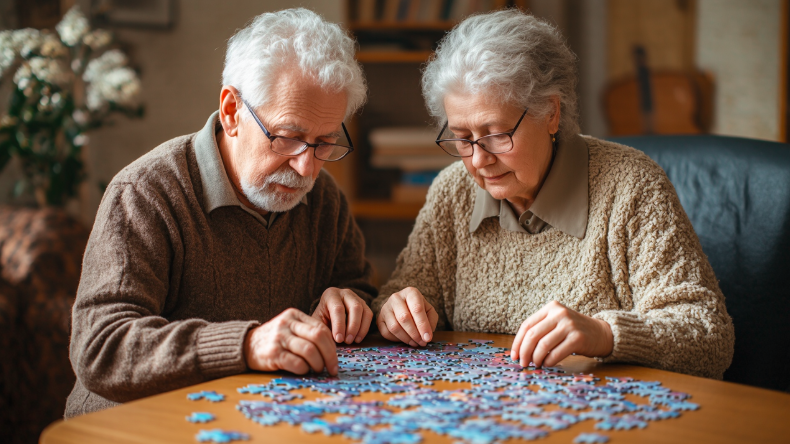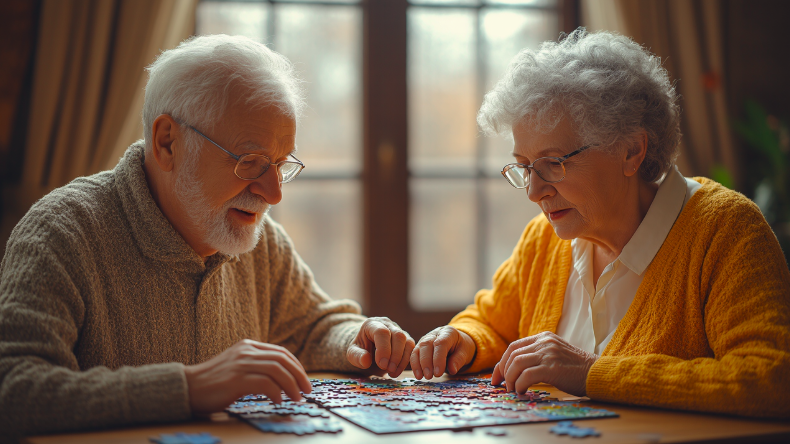Can Puzzles Improve Memory In Seniors? Full Guide Inside
Explore how puzzles support memory, reduce decline, and boost brain health in seniors. Backed by science, research, and senior-friendly tips.
Apr 01, 20258.7K Shares142.9K Views

As people age, it is normal to experience a decline in memory and thinking speed. This condition, known as age-related cognitive decline, often begins after the age of 60. According to the National Institute on Aging, this can affect attention, short-term memory, and decision-making.
In recent years, interest in mental activities that support brain health has grown. One such activity is puzzle solving. Jigsaw puzzles, crosswords, and number games are now widely used in senior care centers and homes. These puzzles are enjoyable and low-stress, which makes them popular among older adults.
Health professionals and researchers are paying attention to how these activities may protect brain function. Studies suggest that staying mentally active can support memory and slow down age-related decline. In fact, many experts believe that you can improve memory through puzzles, as they engage various cognitive functions, making them an effective tool for enhancing brain health. This growing interest has led many to explore whether puzzles can truly improve memory in seniors.
How Puzzles Stimulate Cognitive Functions In Older Adults
Solving puzzles activates several areas of the brain at once. Tasks like finding matching shapes or completing a picture involve short-term memory, problem-solving, and attention. These skills are key parts of healthy cognitive function.
According to research published in Frontiers in Aging Neuroscience, engaging in mentally stimulating activities like puzzles can help maintain brain plasticity. This means the brain can keep forming new connections, even in older age.
Jigsaw puzzles, in particular, boost visual-spatial reasoning. This skill helps people understand and organize visual information, which is useful in daily tasks. Crosswords and word games help with language recall and word association, supporting verbal memory.
Over time, these brain exercises may slow mild cognitive decline. Experts like those from the Alzheimer’s Society note that mental stimulation may help delay symptoms in early stages of memory loss. While puzzles are not a cure, they offer a fun way to keep the brain active and engaged.
Scientific Research On Puzzles And Memory Retention In Seniors
Over the past two decades, researchers have studied how puzzles affect brain health in seniors. Many studies now support the idea that puzzles can help maintain cognitive function as people age.
A 2019 study published in The International Journal of Geriatric Psychiatryfound that older adults who regularly completed word and number puzzles scored higher on memory and reasoning tests. In fact, their cognitive function was comparable to individuals 8 to 10 years younger who didn’t do puzzles regularly.
Similarly, the Journal of the International Neuropsychological Societyreported that seniors who engaged in daily cognitive tasks—such as solving puzzles, reading, or playing games—showed slower decline in memory over time. The Alzheimer’s Association also encourages brain-challenging activities as part of a “brain-healthy lifestyle,” especially in the early stages of aging.
The National Institute on Aging (NIA) includes puzzles among mentally stimulating activities that may support brain plasticity. Brain plasticity is the brain’s ability to form new connections. This is especially important for seniors, as plasticity tends to decline with age.
However, there are limitations. While puzzles may delay cognitive decline, they do not reverse memory loss or cure diseases like Alzheimer’s. Researchers highlight that puzzles should be part of a wider lifestyle plan that includes social activity, physical exercise, and a balanced diet.
Best 5 Types Of Puzzles For Seniors’ Cognitive Support
1. Jigsaw PuzzlesJigsaw puzzles improve visual-spatial reasoning, memory, and attention. Seniors benefit from the challenge of matching shapes and colors to complete a full image. This process helps keep the mind active and focused.
🔹 Accessibility Tip:Choose large-piece puzzles (24–100 pieces) with high-contrast images for those with visual or motor difficulties. Brands like Ravensburger and Cobble Hill offer senior-friendly options.
2. Crossword PuzzlesCrosswords improve verbal memory and vocabulary recall. They encourage seniors to retrieve words and connect meanings, which strengthens language-related brain pathways.
🔹 Tip:For seniors with mild cognitive issues, simplified crosswords or clue-aided formats can make the experience more enjoyable.
3. SudokuSudoku strengthens logical thinking, number recognition, and pattern-solving. It involves planning and concentration, which can enhance focus and decision-making in seniors.
🔹 Tip:Use beginner or medium-level Sudoku books that offer clear instructions and larger print.
4. Word SearchesWord searches are good for attention, word recognition, and spelling. They offer a gentler cognitive challenge compared to crosswords and can be completed in short sessions.
🔹 Tip:Choose puzzles with themes that interest the senior—like gardening, nature, or travel—to make the task more engaging.
5. Logic & Matching GamesGames like “spot the difference,” matching tiles, or simple brainteasers help boost short-term memory and processing speed. These games work well for seniors with mild memory loss.
🔹 Tip:Opt for color-coded or image-based puzzles that do not rely heavily on reading for those with vision or language limitations.
Why Accessibility MattersFor older adults, comfort and ease of use are essential. Puzzles with large text, easy-to-grip pieces, and clear images reduce frustration and make the activity more rewarding. Many companies now design puzzles specifically for aging adults or those with early-stage dementia.
Daily Puzzle Habits And Lifestyle Tips For Brain Health
1. Add Puzzles to a Daily RoutineDoing puzzles at the same time each day helps build a habit. The National Institute on Aging suggests creating a brain-friendly schedule with regular mental activities. A morning or early afternoon puzzle session works well when the mind is most alert. Aim for 20 to 30 minutes daily to keep the brain engaged without causing fatigue.
2. Choose the Right Puzzle for the DayVarying the type of puzzle can keep the brain stimulated. Start the week with a jigsaw puzzle, use crosswords mid-week, and try Sudoku or a word search later on. This mix strengthens different brain functions like logic, memory, and visual focus.
3. Do Puzzles with OthersSocial puzzles are more than just fun—they support brain and emotional health. The Alzheimer’s Association highlights the benefits of social engagement for cognitive well-being. Seniors can solve puzzles with friends, join a puzzle group, or involve family members. This boosts memory and also reduces feelings of loneliness.
4. Create a Puzzle-Friendly SpaceSet up a quiet, well-lit area with a comfortable chair and table. Keep the puzzle within reach so it’s easy to return to. For those with visual or mobility issues, use large-piece puzzles or puzzle boards designed for seniors.
5. Combine Puzzles with a Healthy LifestylePuzzles work best when combined with other brain-healthy habits. According to the Global Council on Brain Health, seniors should also include:
- Daily walking or light physical activityto improve blood flow to the brain.
- A balanced dietrich in fruits, vegetables, and healthy fats.
- Adequate sleepto support memory processing.
- Hydration and stress management, such as deep breathing or music therapy.
6. Set Achievable Puzzle GoalsCaregivers can help seniors set small puzzle goals, like completing one section of a jigsaw or solving three crossword clues a day. Reaching these goals gives a sense of progress and keeps the motivation high.
❓ FAQs
Do Puzzles Help Prevent Memory Loss In Older Adults?
Puzzles cannot fully prevent memory loss, but they may help slow it down. According to the Alzheimer’s Association, mentally stimulating activities like puzzles support brain health and may delay the onset of memory decline in aging adults.
How Often Should Seniors Do Puzzles For Brain Benefits?
Experts recommend doing puzzles regularly—ideally 20 to 30 minutes per day. The National Institute on Aging encourages seniors to include brain exercises like puzzles as part of a daily routine to maintain cognitive function.
What Are The Best Puzzles For Seniors With Early Dementia?
Large-piece jigsaw puzzles, simple word searches, and matching games are ideal. According to the Alzheimer’s Society, these types of puzzles support memory, focus, and coordination without causing frustration.
Can Puzzles Slow Down Alzheimer’s Or Cognitive Decline?
Puzzles may help slow cognitive decline in early stages but are not a cure. The Alzheimer’s Association notes that regular mental activity can support memory and delay symptoms, especially when combined with a healthy lifestyle.
Are Digital Puzzles As Effective As Traditional Ones?
Yes, digital puzzles can be effective if they offer similar mental challenges. Research in Frontiers in Aging Neuroscienceshows that both paper-based and digital puzzles help stimulate the brain when designed properly.
Is It Ever Too Late For Seniors To Benefit From Puzzles?
No, it is never too late to start. The Global Council on Brain Health confirms that brain stimulation at any age can support mental sharpness and promote active aging, even in the later years.
Do Puzzles Also Help With Mood Or Emotional Well-being?
Yes, puzzles can improve mood and reduce stress. The Alzheimer’s Society highlights that engaging in puzzles brings a sense of accomplishment, improves focus, and helps reduce anxiety in older adults.
What’s The Ideal Puzzle Difficulty For Elderly Beginners?
Seniors new to puzzles should start with 100 to 300 large-piece jigsaw puzzles or easy-level crosswords. These provide challenge without overwhelming the user, especially for those with mild memory concerns.
Latest Articles
Popular Articles
